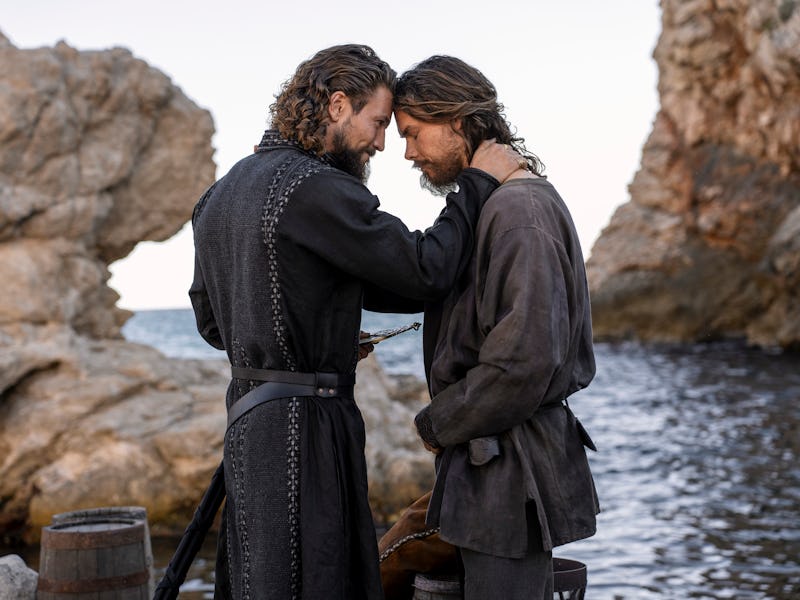Vikings: Valhalla Season 3 Reluctantly Embraces the End of an Era
The Netflix Viking drama tries (and mostly succeeds) to conquer the world.

It’s pretty rare for a Netflix series to get a second season order — and rarer still for the streamer to commit to three seasons sight unseen, especially as the “Golden Age” of streaming feels more and more like a bygone legend. Vikings: Valhalla is one of a chosen few to take its story beyond its inaugural season, and it’s been quietly dominating on Netflix ever since. As a spinoff of the History Channel’s gritty, gripping period piece, Valhalla’s chances for success are decidedly higher than its peers. The original Vikings never gained the notoriety of sister shows like Game of Thrones, but it still dominated a niche that few shows manage to achieve.
Valhalla is no different: historical fantasies and costume dramas are having a real moment right now, but few feel as realized as the Netflix series. After two successful seasons, it understands its lane, and seems content to deliver a grounded narrative with a side of period-accurate ultraviolence. Like its parent series it does have competition in the form of House of the Dragon or FX’s most recent win, Shōgun. But Vikings: Valhalla does what it can to cut through the noise, mostly by setting its sight far beyond the reaches of Kattegat. Its third season tries (and mostly succeeds) to conquer the world, and that ambition pays off in some visually stunning, appropriately brutal, and occasionally very sensual adventures.
The last season of Valhalla saw our core trio — Norwegian Prince Harald (Leo Suter), his Greenlandian BFF Leif Erikson (Sam Corlett) and Freydís Eiríksdóttir (Frida Gustavsson), Leif’s sister — scattered to the winds. With Christianity sweeping the region, spearheaded partially by Viking kings determined to expand their territory, Norway, Denmark, and England are essentially off-limits to those who worship the old Norse gods. Harald is Christian, but he lacks the means to raise an army and reclaim his throne in Kattegat. So he pledges his sword to Emperor Romanos of the Byzantine Empire (Nikolai Kinski), hoping to win his fortune as a mercenary. Leif follows Harald to Constantinople, while Freydís finds refuge in Jomsburg, one of the last Viking strongholds in Scandinavia.
When we catch up with the heroes in Season 3, seven years have passed. Harald and Leif have earned the army and the riches they set out to find, and amicably part ways so that Leif can discover his own purpose. (There’s some heavy foreshadowing to the exploits of the real Leif Erikson, said to be the first Northman to reach the “New World.” Expect a lot of existential conversations about faith and “the unknown” as Leif sets off on his own.) Freydís, meanwhile, has become the leader of Jomsburg. She also has a son now; it’s Harald’s, but Valhalla doesn’t spend much time on their estrangement. Instead, Freydís is hyperfocused on protecting her people from her Christian enemies, while Harald struggles to embrace his destiny.
Our heroes are growing up in Vikings: Valhalla Season 3.
If all goes to plan, Valhalla’s third season will also be its last. That brings a slightly more esoteric bent to the series: our heroes aren’t getting any younger, and each of them recognizes that in their own way. They’ll be forced to learn the lessons they’ve eluded in prior seasons, and generally strive to be better than they were the day before. But that development is a bit slow to take root. Say what you will about showrunner Jeb Stuart’s plans, but it doesn’t feel like the final season. The sprawling story feels more intricate than ever — at best, you don’t want it to end. At worst, it doesn’t seem like it knows how to.
Valhalla is split between five separate storylines. Apart from the core trio, the series is also focused on Canute (Bradley Freegard), the current king of England, and the last years of his reign. His entourage includes his political advisor Godwin (David Oakes), his wife, Emma of Normandy (Laura Berlin), and the host of kids they share from previous marriages. As a reformed Viking with no definitive heir, Canute is fighting a battle on two fronts: not only is he working hard to make nice with the Catholic church, but he also has to figure out which of his many potential heirs will inherit the throne.
Valhalla doubles down on the political intrigue in its parent series, and it really pays off.
The struggle for succession is arguably the most compelling of Valhalla’s dueling storylines, as it comes closest to embodying the slippery power plays and intense brutality of the original series. Everything else feels a bit like fluff by comparison, heavy on emotional development and a heady dose of hedonism. If this season had a flaw, it’d be in its unwieldy story. Valhalla is supposed to set its heroes up for a satisfactory ending — but by introducing new characters, alliances, and grudges, it loses the momentum designed to carry it to the finish line. The series could easily go on for more seasons, and it’s hard to argue against that idea. Season 3 lacks a sense of urgency, or even a desire to close this particular chapter so soon. It doesn’t help that it only has eight episodes to do so — a major curse of the streaming era.
On the bright side, each episode is more compelling than the last. A Netflix series is designed to be bingeable, and Valhalla certainly doesn’t fail on that front. It’s in telling a complete story that the series seems to stumble, if only because there’s clearly still so much potential in the Vikings spin-off.